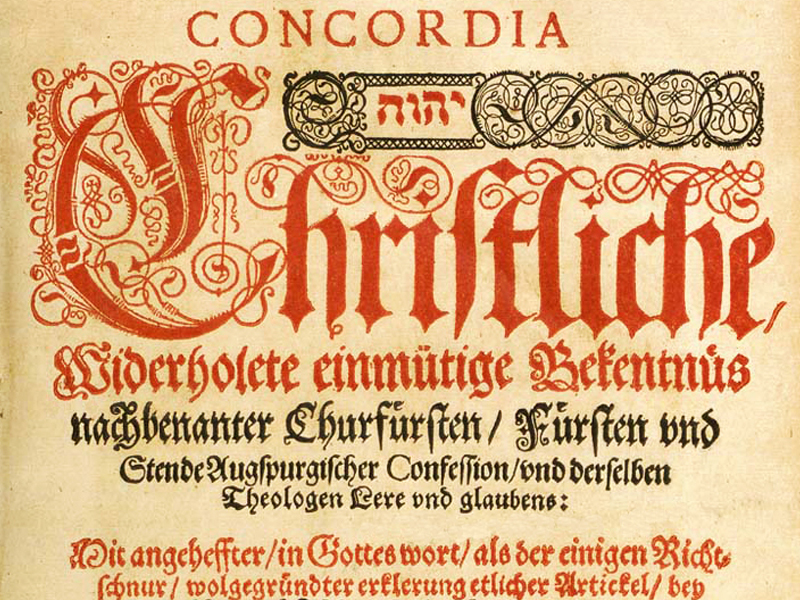by Rev. Jason Lane
In this study of Article III of the Formula of Concord (FC) concerning the righteousness of faith or the righteousness of God, we will see how the Lutheran Confessions address and faithfully refute old and new efforts to refashion the doctrine of justification as some change within us. The doctrine of justification is not about a change in us, but based on what God has done in Christ apart from us. Justification is therefore not a process, but a promise, a promise that creates and gives in reality what God says.
To begin, read FC III:1-5, the Status of the Controversy.[1]
Andreas Osiander (1498-1552), a preacher and reformer in Nuremburg and later court preacher and professor in Königsberg, is the target of FC III:2. Instead of teaching that sinners were justified before God on account of the merits of Christ, whose merits God reckoned to us by faith as righteousness, Osiander taught that we are justified, not on account of Christ’s merits, but on account of Christ’s divine nature dwelling within us. According to Osiander, God sees Christ’s essential nature and His righteousness dwelling in us and, on account of the indwelling of Christ’s divine nature, God accepts us as His own. Sin is not forgiven exactly, but it is diluted to such an extent by Christ’s righteousness that it no longer effects our identity as saints. Thus, Osiander would argue, “Compared with this great ocean of righteousness, the sins of all people are like a drop of water” (FC III:2). His concern was that justification had become judicial fiction, the words of forgiveness were only words about what Christ had done for our salvation, but the forgiveness of sins, the promise of Christ’s righteousness for us, is not Christ Himself, and therefore ineffectual to save us. Osiander wanted something more than a promise. He believed that an imputation of righteousness, a free declaration of forgiveness that credits us with Christ’s righteousness outside of anything in us, is empty and contrary to God’s nature: “Their doctrine is colder than ice who declare that we are counted righteous only on account of the forgiveness of sins and not also because of the righteousness of Christ who dwells in us through faith. For God is not so unjust that He should account that man righteous in whom there is no righteousness at all.”[2]
Osiander wanted justification to be something more substantial than a promise to be received by faith. He couldn’t understand that God’s word of forgiveness actual is powerful and creative, calling into existence the things that are not (Rom 4:17), even calling sinners righteous and thereby making them righteous by His mighty say so.

Another small group, led by the Italian Francesco Stancaro, argued that Christ’s righteousness is our righteousness only according His human nature (FC III:3). He thought that Christ’s divine nature, being equal to the Father and Holy Spirit, did not win for us righteousness, but that Christ’s obedience according to His human nature, under the law, won this righteousness for us. Both errors are quickly dismissed in paragraph 4: “Christ is our righteousness not according to His divine nature alone, nor according to His human nature alone, but according to both natures.” See also paragraphs 54-67 for a fuller explanation of these errors.
The following question are intended to help your reading of FC III.
- Read FC III:4 and 9 and note how the Formula defines the righteousness of faith. What three things are included in this righteousness? Consider why this expanded definition of righteousness addresses Osiander’s concern that the reformers’ teaching of justification is cold.
- Osiander wanted to make the indwelling of Christ the cause of our justification. According to FC III:10-17, however, what is the cause of justification?
- Faith alone receives the treasures of Christ’s obedience. But what is faith? See FC III:11, 43, and Ephesians 2:8-9.
- Read FC III:18-34, in which the term regeneration is defined. The Formula makes clear that whatever precedes or succeeds justification is not justification. From your reading, please explain why the righteousness of faith or justification cannot include our preparation (contrition, repentance, etc.) or even the fruits of our justification (sanctification, good works, etc.)?
- In paragraphs 42-43, the writers compare the teaching of St. Paul and St. James. How is James’ use of justification in James 2 different than that of St. Paul in Romans 3?
- Read paragraphs 44-53, where errors concerning justification are rejected (Negative Statements). Consider how we or many Christians today have fallen into one or more of these errors. How would you lovingly explain to those in error the true biblical teaching on justification? Consider, as you formulate a response, why an error in this doctrine is so dangerous for the soul. Perhaps the quote from Luther in paragraph 6 will help.
Prayer: Lord Jesus, sin still clings to me and I feel that I will never be rid of it. It’s not just in my members, in the things that I do or don’t do, but sin is in my very nature, deep in my heart and mind. Redeem me, O Lord! “Create in me a clean heart!” My efforts are fruitless and my desires are earthly and small. But Yours are not. You are powerful and pure and from above—and You desire that I live. You have paid for me with Your life and made known to me the path of life. Speak Your word of forgiveness into my ear. Say it to me again and again. Though I falter a thousand times and though sin sticks to me daily, take not Your Holy Absolution or Your Holy Spirit from me, because Your word does what it says and creates out of nothing. You say that I am righteous, so I believe it. Amen.
The Rev. Jason D. Lane is assistant professor of theology at Concordia University Wisconsin in Mequon, WI.
[1]. Some helpful historical background as well as some insightful commentary on the controversy can be found in The Lutheran Confessions: History and Theology of The Book of Concord, edits. Charles Arand, Robert Kolb, and James A. Nestingen (Minneapolis: Fortress Press, 2012), 217-226.
[2]. A. Osiander, Disputation Concerning Justification, 1550, quoted from Henry P. Hamann, “The Righteousness of Faith Before God” in A Contemporary Look at the Formula of Concord (St. Louis: CPH, 1978), 137-162 (here, 141).
